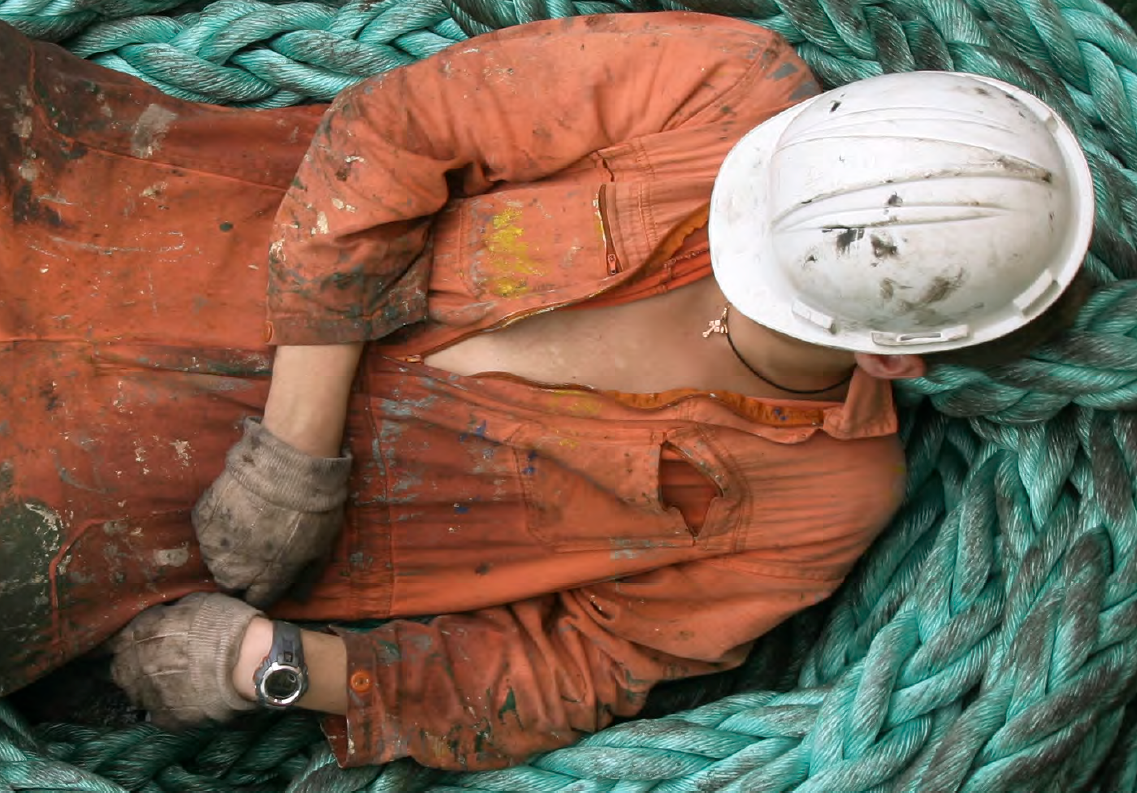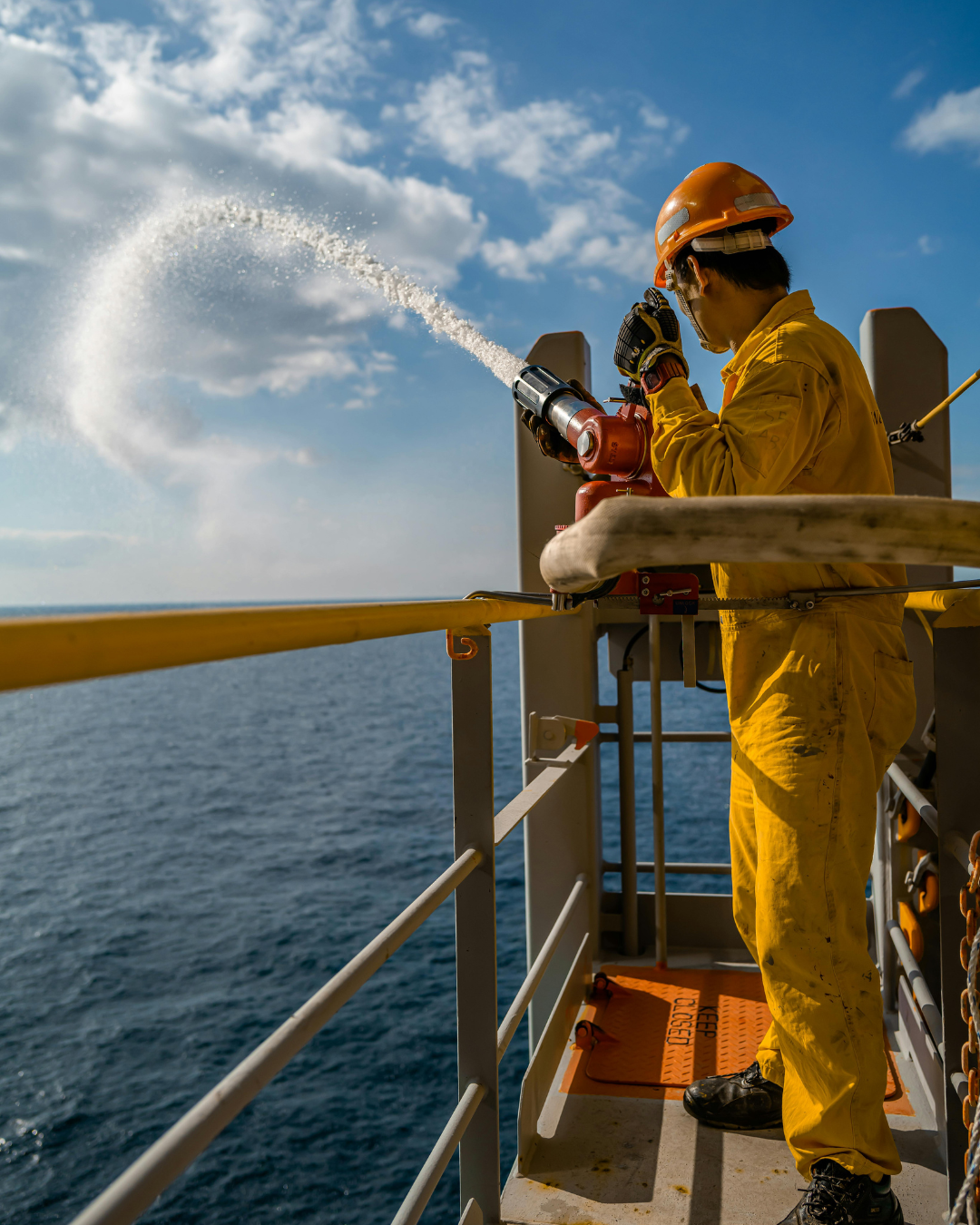How Harassment and Bullying Affect Seafarers' Mental Health: Prevention and Support Strategies
Table of Contents
Introduction
Mental health is a critical component of overall well-being, especially in the maritime industry where seafarers face unique challenges. Long periods away from home, isolation, demanding work schedules, and the confined environment of a ship can significantly impact mental health. Addressing mental health is essential not only for the personal well-being of seafarers but also for maintaining high levels of performance and safety on board.
Section 1: Understanding Harassment and Bullying at Sea
Definition and Types of Harassment and Bullying in the Maritime Context

- Verbal Abuse: Insults, threats, and derogatory comments.
- Physical Intimidation: Threatening gestures or physical aggression.
- Social Exclusion: Isolating individuals from group activities or conversations.
- Unwarranted Criticism: Excessive or unjustified negative feedback.
Statistics and Real-Life Examples of Harassment and Bullying Incidents
Recent studies highlight the prevalence of harassment and bullying in the maritime industry. Reports indicate that between 8% to 25% of seafarers have experienced workplace bullying, with rates exceeding 50% among women seafarers. The International Seafarers' Welfare and Assistance Network (ISWAN) reported that in 2022, 15% of seafarers seeking help cited experiences of abuse, bullying, harassment, or discrimination, a significant increase from 8% in 2021 (ISWAN) (MarineLink).
The Unique Challenges Faced by Seafarers
The maritime environment poses unique challenges that exacerbate harassment and bullying. Seafarers live and work in confined spaces for extended periods, blurring the lines between their professional and personal lives. This environment can amplify the impact of negative behaviors. Key challenges include:
- Isolation: Prolonged periods away from family and friends can increase vulnerability to bullying and harassment.
- Confined Living Conditions: The lack of privacy and constant proximity to colleagues can intensify conflicts.
- Hierarchical Structure: The rigid hierarchy on ships can make it difficult for victims to speak out or seek help without fear of retaliation.
- Limited Access to Support: Seafarers often have limited access to mental health resources and support services while at sea.
Addressing these challenges requires comprehensive strategies and training programs. Maritime Trainer offers specialized Harassment and Bullying Training designed to equip seafarers with the knowledge and tools to prevent and manage such incidents effectively. By fostering a culture of respect and support, we can mitigate the impact of harassment and bullying on seafarers' mental health.
Moving Forward
Tackling harassment and bullying at sea necessitates a multi-faceted approach involving clear policies, effective training, and robust support systems. Maritime Trainer is committed to promoting a safe and supportive work environment through its tailored training programs and resources. By addressing these issues head-on, we can enhance the mental well-being of seafarers and ensure a healthier, more productive maritime industry.
Section 2: Impact on Mental Health
Detailed Exploration of How Harassment and Bullying Affect Mental Health

Harassment and bullying at sea can have severe and lasting impacts on the mental health of seafarers. These negative behaviors not only create a toxic work environment but also lead to significant psychological distress. Understanding these impacts is crucial for developing effective prevention and support strategies.
Stress and Anxiety
Harassment and bullying are major sources of stress and anxiety for seafarers. Constant exposure to verbal abuse, physical intimidation, or social exclusion can lead to chronic stress, which adversely affects both mental and physical health. Seafarers experiencing these issues often report symptoms such as:
- Persistent worry and fear: Victims may constantly worry about potential conflicts and hostile interactions.
- Sleep disturbances: Anxiety can lead to insomnia or poor-quality sleep, further exacerbating stress levels.
- Physical symptoms: Chronic stress can manifest as headaches, stomach issues, and other physical ailments.
According to the International Seafarers’ Welfare and Assistance Network (ISWAN), many seafarers report feeling stressed and anxious due to harassment and bullying, which can lead to severe mental health issues if not addressed promptly (ISWAN) (ISWAN).
Depression and Feelings of Isolation
The isolated nature of maritime work can intensify the effects of harassment and bullying, leading to depression and feelings of isolation. Seafarers spend long periods away from family and friends, which can make them more vulnerable to these negative behaviors. Depression among bullied seafarers often manifests as:
- Persistent sadness and hopelessness: Victims may feel a constant sense of despair and lack of motivation.
- Loss of interest: Activities that once brought joy may no longer seem appealing.
- Social withdrawal: Victims might isolate themselves further, avoiding interactions with colleagues to escape potential harassment.
Data from SeafarerHelp, a helpline provided by ISWAN, indicates that 15% of seafarers who contacted them in 2022 reported experiences of abuse, bullying, or harassment, highlighting the significant impact on their mental health (ISWAN) (SeafarerHelp).
Decreased Job Satisfaction and Performance
Harassment and bullying can also lead to decreased job satisfaction and performance. Victims often feel undervalued and unsupported, which can result in:
- Lower productivity: The mental toll of bullying can reduce focus and efficiency.
- Higher absenteeism: Victims may take more sick days due to the stress and anxiety caused by bullying.
- Turnover intentions: Long-term exposure to harassment can drive seafarers to leave their jobs, seeking safer and more supportive environments.
Research shows that bullied seafarers are more likely to report decreased job satisfaction and are less engaged in their work, which can negatively impact the overall performance of the crew and the safety of maritime operations (Maritime Fairtrade) (SeafarerHelp).
Case Studies and Testimonials from Affected Seafarers
Real-life examples provide a deeper understanding of the impact of harassment and bullying on seafarers' mental health. For instance, one seafarer, George, shared his experience of racial discrimination and bullying on board. He described being treated differently due to his ethnicity, facing verbal abuse, and being excluded from social activities. This treatment led to significant mental distress, including feelings of depression and worthlessness (Maritime Fairtrade).
Section 3: Prevention Strategies
Company Policies and Procedures to Prevent Harassment and Bullying
Establishing comprehensive company policies and procedures is fundamental to preventing harassment and bullying in the maritime industry. Effective policies should clearly define what constitutes harassment and bullying, providing specific examples to avoid ambiguity. These policies must be communicated to all employees, ensuring they understand their rights and responsibilities
- Clear Definitions: Detailed descriptions of unacceptable behaviors, including verbal abuse, physical intimidation, and social exclusion.
- Complaint Procedures: Step-by-step guidelines for reporting incidents, ensuring confidentiality and protection against retaliation.
- Regular Training: Mandatory training sessions for all crew members on recognizing and preventing harassment and bullying.
The International Chamber of Shipping (ICS) has developed a set of industry principles to guide companies in establishing these policies. These principles emphasize the importance of data-driven approaches, inclusivity, and leadership commitment to eliminating harassment and bullying (International Chamber of Shipping) (Seatrade Maritime News).
Importance of Leadership and Creating a Positive Onboard Culture
- Visible Commitment: Leaders should openly communicate their commitment to eliminating harassment and bullying.
- Support Systems: Establish support networks and peer mentoring programs to help crew members feel supported.
- Regular Feedback: Encourage open dialogue and provide opportunities for crew members to voice concerns without fear of reprisal.
Strong leadership can significantly reduce the incidence of harassment and bullying by creating an environment where such behaviors are not tolerated and victims feel safe to report incidents (International Chamber of Shipping) (Seatrade Maritime News).
Training Programs and Workshops Focused on Harassment Prevention
- Awareness: Train crew members about the signs of harassment and bullying and their impact on mental health.
- Intervention Skills: Teach practical skills for intervening in harassment situations safely and effectively.
- Support Resources: Inform crew members about available support resources, both onboard and ashore.
Maritime Trainer offers specialized training programs designed to address these needs. These programs provide seafarers with the tools and knowledge to prevent and manage harassment and bullying effectively. You can find more details about their training offerings here.
Role of Reporting Systems and Ensuring Anonymity for Whistleblowers
- Anonymous Hotlines: Dedicated hotlines where seafarers can report incidents without revealing their identity.
- Online Platforms: Secure online platforms for submitting complaints and tracking the progress of investigations.
- Dedicated Investigators: Assigning trained investigators to handle complaints impartially and confidentially.
By implementing comprehensive policies, promoting strong leadership, providing regular training, and establishing effective reporting systems, maritime companies can create a safer and more supportive environment for all seafarers. These strategies not only help prevent harassment and bullying but also contribute to the overall well-being and mental health of the crew.
Section 4: Support Strategies
Providing Mental Health Resources and Support for Affected Individuals

Supporting seafarers' mental health involves providing comprehensive resources and support systems to address their unique challenges. These resources can include access to mental health information, self-help materials, and confidential helplines. Organizations like the International Seafarers' Welfare and Assistance Network (ISWAN) offer helplines such as SeafarerHelp, providing 24/7 support to seafarers facing mental health issues, including those affected by harassment and bullying (ISWAN) (SeafarerHelp).
Role of Mental Health Professionals and Counseling Services
Mental health professionals and counseling services play a crucial role in supporting seafarers. Onboard access to trained counselors can provide immediate support for those experiencing mental health challenges. Additionally, partnerships with shore-based mental health services ensure continuous care.
- Onboard Counseling: Providing access to trained mental health professionals during voyages.
- Telehealth Services: Utilizing technology to connect seafarers with counselors and therapists remotely.
- Shore-Based Support: Ensuring seamless transition to shore-based mental health services for continuous care.
Building Peer Support Networks and Fostering a Supportive Community Onboard
Creating a supportive community onboard is vital for fostering mental well-being. Peer support networks can provide informal mental health support, helping seafarers feel less isolated and more connected to their colleagues. These networks encourage open communication and mutual support among crew members.
- Peer Mentoring Programs: Pairing experienced crew members with newcomers to offer guidance and support.
- Support Groups: Establishing regular support group meetings where crew members can share experiences and offer mutual support.
- Team-Building Activities: Organizing activities that promote camaraderie and strengthen bonds among crew members.
- Regular Workshops: Conducting workshops on mental health awareness, stress management, and conflict resolution.
- E-Learning Modules: Providing accessible online courses on various aspects of mental health.
- Awareness Campaigns: Running campaigns to reduce stigma and promote a positive mental health culture onboard.
Maritime Trainer’s "Let's Talk" Series
Maritime Trainer offers the "Let's Talk" series, comprising specialized courses designed to address various aspects of mental health in the maritime industry. These courses range from understanding mental health basics to creating support structures, providing help to others, and promoting positive mental well-being. Here are the courses included in the series:
Let's Talk 1: We All Have a State of Mental Health
- This course introduces the basics of mental health, helping seafarers understand the different states of mental well-being and the importance of maintaining mental health.
Let's Talk 2: Support Structures
- This module focuses on creating effective support structures, both onboard and ashore, to help seafarers cope with mental health challenges.
Let's Talk 3: All Act Supporting Others
- This course teaches seafarers how to provide support to their colleagues, recognizing signs of distress and intervening appropriately.
Let's Talk 4: Promoting Positive Mental Health and Reducing Stigma
- This module aims to promote positive mental health practices and reduce the stigma associated with mental health issues.
By leveraging these comprehensive support strategies and the specialized courses offered by Maritime Trainer, maritime companies can ensure that their crew members receive the necessary support to maintain their mental health and well-being.
Section 5: The Role of Maritime Trainer in Promoting Mental Health
Overview of Maritime Trainer’s Mental Health Training
Maritime Trainer is deeply committed to the mental health and well-being of seafarers. Recognizing the unique challenges faced by maritime professionals, Maritime Trainer offers a comprehensive suite of mental health training programs. These programs are designed to equip seafarers with the knowledge and skills necessary to manage stress, build resilience, and create a supportive onboard environment.
- Understanding Mental Health: This foundational training helps seafarers understand the different aspects of mental health, recognizing the importance of mental well-being alongside physical health.
- Stress Management: Techniques and strategies for managing stress, crucial for maintaining mental health in the demanding maritime environment.
- Building Emotional Resilience: Training on developing emotional resilience to better handle the pressures and challenges of life at sea.
- Creating Supportive Environments: Focuses on building a culture of support and respect on board, reducing the risk of harassment and bullying.
Importance of Mental Health Training for Maritime Professionals
Mental health training is essential for maritime professionals due to the unique and often strenuous nature of their work. The isolation, long periods away from family, and high-stress levels can significantly impact their mental health. Effective training provides several key benefits:
- Awareness and Understanding: Helps reduce the stigma associated with mental health issues and promotes a better understanding among crew members.
- Improved Well-being: Equips seafarers with tools and strategies to manage their mental health, leading to improved overall well-being.
- Enhanced Support Systems: Encourages the development of peer support networks, creating a more supportive and cohesive onboard community.
Research has shown that mental health training can lead to better mental health outcomes, increased job satisfaction, and enhanced productivity among seafarers (ISWAN) (ISWAN).
How Maritime Trainer's Courses Help in Preventing and Managing Harassment and Bullying?
- Recognizing Harassment and Bullying: Traing crew members about what constitutes harassment and bullying, helping them recognize these behaviors.
- Intervention Skills: Teaches effective intervention techniques to address harassment and bullying promptly and appropriately.
- Support Systems: Establishes robust support mechanisms to assist victims of harassment and bullying.
By fostering a culture of respect and support, these courses help reduce the incidence of harassment and bullying, contributing to a healthier work environment (ISWAN) (Nautilus International).
Feedback from Participants on the Effectiveness of the Training
Feedback from participants underscores the effectiveness of Maritime Trainer’s mental health training programs. Seafarers have reported significant benefits, including:
- Increased Awareness: A better understanding of mental health issues and how to address them.
- Practical Skills: Gained practical skills for managing stress and supporting colleagues.
- Enhanced Support: Created a more supportive onboard environment where crew members feel comfortable discussing mental health issues.
Participants have shared testimonials highlighting the positive impact of the training on their mental well-being and the overall work environment. For more insights and detailed testimonials, you can explore Maritime Trainer’s Mental Health Courses (ISWAN) (Nautilus International).
By providing comprehensive mental health training, Maritime Trainer demonstrates a deep commitment to the well-being of maritime professionals, helping to create a safer and more supportive work environment for all seafarers.
Conclusion
Recap of the Importance of Tackling Harassment and Bullying for Mental Health
Harassment and bullying have profound negative impacts on the mental health of seafarers. These behaviors create a toxic work environment, leading to increased stress, anxiety, depression, and feelings of isolation among crew members. Addressing these issues is crucial not only for the well-being of individual seafarers but also for the overall safety and productivity of maritime operations.
- Mental Health Impact: Persistent exposure to harassment and bullying can result in serious mental health issues such as chronic stress, depression, and even suicidal thoughts. These issues are exacerbated by the isolated and confined nature of maritime work (ISWAN) (ISWAN).
- Operational Efficiency: A mentally healthy crew is more focused, productive, and capable of performing their duties safely and efficiently. Addressing harassment and bullying helps in creating a supportive work environment that enhances overall operational efficiency (International Chamber of Shipping) (ISWAN).
Call to Action for Maritime Companies to Implement Comprehensive Prevention and Support Strategies
Maritime companies have a critical role to play in preventing and managing harassment and bullying on board. Implementing comprehensive prevention and support strategies is essential to fostering a safe and supportive work environment.
- Develop Clear Policies: Establish clear definitions and policies regarding harassment and bullying, and ensure these are communicated effectively to all crew members.
- Provide Regular Training: Implement regular training programs to train crew members about recognizing, preventing, and addressing harassment and bullying.
- Create Reporting Systems: Develop robust reporting systems that ensure confidentiality and protection for whistleblowers.
- Promote a Positive Culture: Encourage leadership to model respectful behavior and foster an inclusive, supportive culture on board.
Maritime Trainer’s mental health training courses are designed to help companies implement these strategies effectively, providing seafarers with the tools and knowledge they need to create a safer work environment (ISWAN) (Nautilus International).
Encouragement for Seafarers to Speak Up and Seek Help When Needed
Seafarers should feel empowered to speak up about harassment and bullying and seek help when needed. It is important for seafarers to understand that they are not alone and that there are resources available to support them.
- Report Incidents: Use the established reporting systems to report any incidents of harassment or bullying.
- Seek Support: Reach out to mental health professionals, counselors, or peer support networks for help.
- Participate in Training: Engage in mental health and anti-harassment training programs to build resilience and learn effective coping strategies.
Support services such as ISWAN’s SeafarerHelp provide 24/7 confidential assistance to seafarers facing mental health challenges, including those affected by harassment and bullying (ISWAN) (ISWAN).
By collectively addressing harassment and bullying and promoting mental health, the maritime industry can ensure a safer, more supportive environment for all seafarers. This commitment not only enhances the well-being of individuals but also contributes to the overall success and sustainability of maritime operations.
Contact us

Approved & Certified by Bureau Veritas

We are proud to be member of


